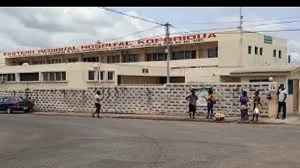A recent report by the World Health Organization (WHO) revealed a concerning prevalence of Postpartum depression(PPD) in Ghana with a rate of 27% among women who deliver in various healthcare facilities across the country.
Severe cases of PPD result in psychosis, a serious mental health issue.
Unfortunately, many hospitals in Ghana, including the Eastern Regional Hospital, a major regional referral facility, lack the essential medical equipment necessary for properly managing this condition, such as electroconvulsive therapy and electroencephalogram.
Electroconvulsive therapy is a widely recognized treatment for severe depression or bipolar disorder that has not responded to other interventions.
This procedure involves the brief electrical stimulation of the brain while the patient is under anaesthesia.
Electroencephalogram, on the other hand, is a test that measures the electrical activity in the brain and can provide valuable insights into the underlying neurological processes associated with postpartum depression.
Psychiatrists at the Eastern Regional Hospital say the absence of these critical tools has significant implications for the effective treatment of postpartum depression in the region.
According to Dr. Gyanwa Opare-Addo, a specialist psychiatrist, the lack of these essential medical devices at the hospital is a serious issue, given the high number of maternal Mental health cases, including psychiatric conditions such as depression and psychosis, that women commonly experience during pregnancy and the postpartum period.
“As we speak we don’t have those machines in the hospital. In fact, if I should say we don’t have it in most of the psychiatric hospitals in Ghana. They have all broken down so it makes it very difficult to even refer them to the bigger hospitals. It will be better if we get it in these hospitals so that we can give them better care”, Dr. Gyanwa Opare-Addo stated.
She describes as "very serious, most of our mothers go through this especially those that have their children at NICU. Even for a day, it is not easy for a mother to go through. Because of the hormonal changes that come about, you have to think about whether your child will survive or not. So these lead to a lot of depressive situations or even sometimes a severe form which we call psychosis.”
During a donation and payment of medical bills of mothers and babies at the Neonatal Intensive Care Unit(NICU) of the Eastern Regional Hospital by Nana Owiredu Wadie I, Nkosuohene of Kwahu Nkwatia and founder of Kabaka Foundation, Dr. Gyanwa Opare- Addo passionately appealed to the foundation to once again come to the aide of the hospital.
“These mothers when they are pregnant or they give birth go through psychiatric conditions like depression, psychosis, etc. And so we will want Nana Owiredu Wadie and Kabaka Foundation to come to our aide to help provide an electroconvulsive therapy for the hospital that will help to manage mothers that experience psychosis without having to use medications as we often use.”
She added “Also we would want Nana to provide an EEG, to help also determine the complications these children who find themselves in the NICU so early to manage well. Also, we want Nana to turn an eye to the mental health Unit and also rehabilitate the place so that when these mothers go through this situation we can give them better and dignified management” Dr. Gyanwa Opare-Addo, Specialist Psychiatrist appealed.
Nana Owiredu Wadie I, assured the foundation will consider the appeal made to provide the equipment to improve quality health care for pregnant women.
The seven million cedis fully furnished NICU facility was built and donated to Eastern Regional Hospital by Nana Owiredu Wadie I in September 2023 to celebrate his birthday.
He visits the facility every year on his birthday to donate and pay the medical bills of nursing mothers and their babies on admission.
The Interventions by Nana Owiredu Wadie I and his Kabaka Foundation are in line with a mission to support Ghana achieve Sustainable Development Goals (3) which is to ensure healthy lives and promote well-being for all at all ages.
Health News of Wednesday, 9 October 2024
Source: starrfm.com.gh

















